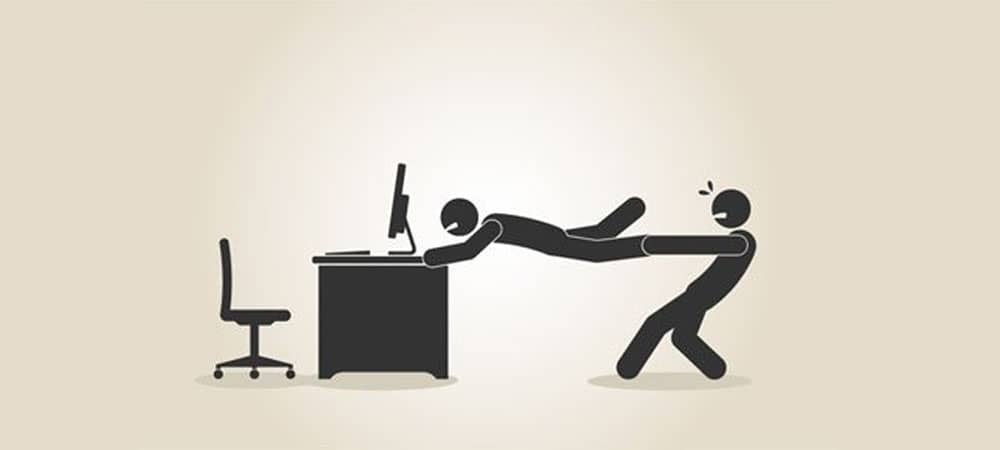Once upon a time there was a good job. A safe job. One of those jobs that gave you enough to live on, even enough to support a family.
When the time came, after so much work, there were also pensions that allowed you to rest and live the remaining years with dignity.
But there was a problem.
This good job wasn't for everyone. It was mostly for white men, and mostly in certain places, like a factory or office.
For everyone else, there was a job that paid less, with fewer benefits or no benefits. And over time there has always been less good work, and there has always been less compensation.
Since about the mid-40s, everyone has been encouraged to seek in their work all the necessities of life: a living wage, retirement benefits, affirmation, prestige, identity. The meaning of life, perhaps. Benefits that work has never really given, has never given to everyone and have become increasingly rare.

And then came the Plague.
The pandemic has made matters even worse. Millions of front-line workers became heroes by accident, indeed by force. They risked their lives doing a job that often offered them little more than a starvation wage.
Even for those who have been able to remain in the relative safety of their homes, the pandemic has taken the joy, the camaraderie, the balance out of work. According to a 2020 survey, 40% of workers (most of them in smart working) reports experiencing burnout during the pandemic.
The problem, I can assure you because I experienced it firsthand, was even worse for parents with children at home, especially for working mothers. Many have paid a very high price, including exhaustion and depression.
The pandemic was also a turning point
Covid has also done something else, perhaps a small miracle among so much suffering. Many workers have reevaluated their work in the face of new dangers and have had to, wanted to revise their priorities. The pandemic has led to a record number of people leaving their jobs (I mean voluntarily).
In Italy and around the world there are many who want to change their lives. A phenomenon that is leading employers and policy makers to rethink work and the way it dominates our days.
I think this event changed everything. Forever, radically. How will it transform the world?
We will (probably) always have a job, but work as the focus of life may be on the verge of extinction.
Work as a reason for living will disappear.
Over the past 70 years or so, in the West at least, retail, hospitality, and other service jobs have proliferated while manufacturing and other jobs that once provided high-paying jobs with benefits have shrunk.
This is one of the reasons why wages have remained stagnant and workers' purchasing power has progressively declined.
To some extent, today's job crisis is due to this huge expansion of the service sector. An industry that was not covered by the kind of regulations, trade unions or social norms that once guaranteed work.
The job got bad as hell.
Other factors have also combined to worsen jobs. The hours have extended, because more and more workers have fallen into "atypical" schemes, especially those in the digital sector.
The rise of “just-in-time scheduling” has paid off the retail and service sector increasingly unpredictable, transferring this uncertainty also into the lives of workers.
The same jobs have become less pleasant. Commerce, for example, has moved towards more customer self-service and away from the qualified type of model. In summary? Less opportunity to interact with customers, and more emphasis on mechanically keeping people moving through a store,
The coup de grace
As mentioned, the spread of the Covid-19 it has made work even more difficult for huge swathes of workers. While some frontline workers, such as doctors, are well paid, many others have had to contend with low pay and lack of protection.
In general, Covid has questioned our psychological and emotional relationship with work.
Work has long been a social outlet: more new friendships are formed through work than in any other environment, including school and other social settings. The pandemic has put an end to bar chatter and jokes in the relaxation room, making the jobs much more essential and oriented towards a purely productive goal.
Live to work or work to live?
The idea that we must toil like hamsters in a wheel to earn the necessities of life perhaps dates back to the Protestant Reformation of the 16th century. Thinkers from Benjamin Franklin to Karl Marx have proposed various versions of the idea that “work gives meaning to life.”
The late 20th and early 21st centuries have taken this idea to the extreme. People have started to put careers higher and higher among their priorities in life.
Today there are many who question the huge role that work plays in their lives.
Millions of people have left their jobs in recent months, often looking for safer, less stressful alternatives or both. The pandemic parenthesis offered an important reason for reflection.
Employers are also facing a paradigm shift
The pandemic has shown not only workers but many employers that big changes are possible in the way we work. Whether it's working from home or taking some time off in the middle of the day to take care of a baby.
While some of these changes aren't necessarily ideal, the point is that a job doesn't have to be a strict, all-consuming routine that upsets the rest of your life.
The pandemic has shown that companies can survive and do well if their staff needs are met reasonably.
Improving work means empowering workers
Essentially, the last year and a half has shown everyone that many jobs are terrible and that they don't have to be. What will happen now?
The answers are many. At the very least, many say, it's time to improve the work. Starting with the salary. It must be adjusted to the cost of living. Those who work full time cannot earn insufficient money for a decent life.
The minimum income debate is not homogeneous across countries and there is no universal measure. A measure that also takes into account improvements such as flexibility in hours and paid holidays.
Future work: less time, more time

First question: is it really essential to be all in one place from 9am to 17pm (or more), five days a week?
Second question: Does work really have to take up 40 hours of our week?
A recent experiment with shorter working weeks in Iceland it was a great success. The whole world has been talking about it, and companies like Kickstarter are now trying the idea.
An idea born of the times, which will make its way. Millennials will be the first generation to overturn the relationship between "living to work" and "working to live".
Towards universal benefits?

Third question: is it really necessary that so many aspects of our life are related to our work?
Universal and equitable healthcare, a universal and equitable pension system, a universal basic income they could free people from the tyranny of work.
With universal, non-work-related benefits, workers can make better choices. This is what happened to some extent with the subsidies given in the pandemic, or in the states that have adopted welfare measures such as citizenship income.
Aid like this has made it a little easier for unemployed workers to hang on to low-paying jobs with poor conditions. It made them less vulnerable to exploitation.
Increase and expand basic income
Some experts propose even bigger changes to separate jobs from the most basic needs.
Changes, however, which would not have the aim of putting an end to jobs. People would still work (some research also shows that providing people with a basic income actually increases employment). But he would have more power to demand fair conditions or to leave an abusive job and find a better one because it would have an underlying safety net.
Overcoming resistances
Such a plan, or any of numerous other approaches to separating our basic livelihoods from wage labor, is sure to face political opposition, as it likely requires significant tax increases. It also requires changing a core belief: that we should earn the basic necessities of life through our work.
Yet the idea that we actually earn our income has already been exposed as a fraud: just look at the fact that the average CEO earned nearly 300 times the average worker's salary last year, a gap that is only growing.
If we can take income off work (and that's what happened in the job market) why not do it everywhere?
For now, it sounds like a fairy tale: the idea that in the future we will all be able to choose to work or not work based on our desires, rather than the threat of starvation.


